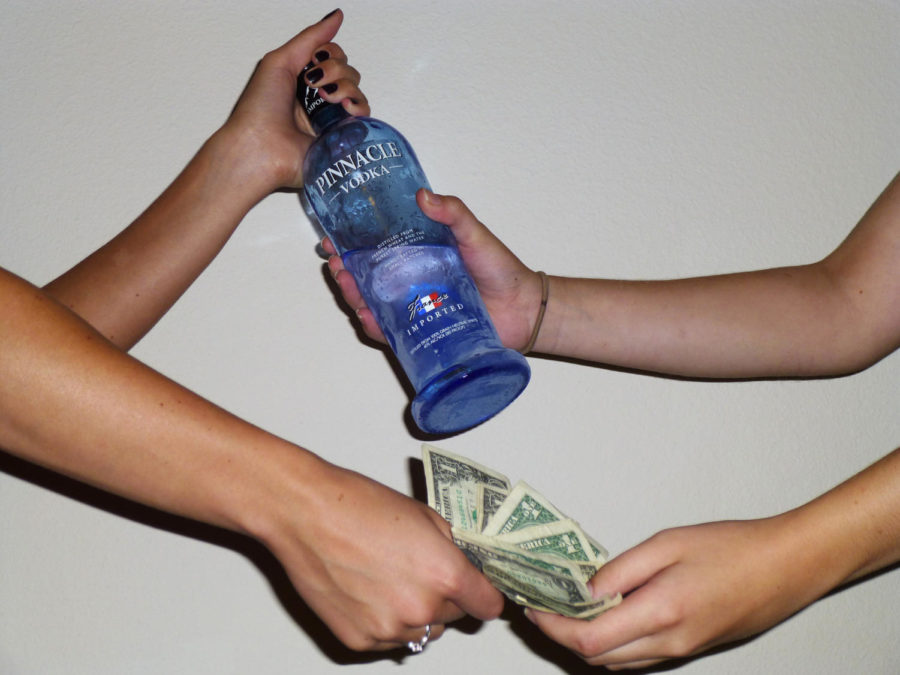Ames Police investigates minors being provided with alcohol
Illustration: Katie Herr/ Iowa State Daily
A recent investigation was conducted by the Ames Police Department’s Safe Neighborhoods Team regarding individuals giving alcohol to minors. Twenty citations were issued for minors in possession of alcohol and 11 individuals were arrested for providing alcohol to minors.
September 27, 2013
In late August, the Ames Police Department’s Safe Neighborhoods Team began an investigation into individuals providing alcohol to people younger than 21 years of age.
Sgt. Mike Arkovich said a thorough investigation is conducted at the beginning of every academic year. The Safe Neighborhoods Team also investigates intermittently throughout the year, especially near Veishea.
“It really helps curb the underage possession and consumption and helps with intoxication levels,” Arkovich said. “A lot of it would be word of mouth, so when somebody got arrested and would tell their friends, it helps as well.”
During the investigation, 11 individuals were arrested for providing alcohol to persons younger than 21 years of age during the investigation. Three individuals were cited for providing alcohol to underage persons.
An 18, 19 or 20-year-old who provides another with alcohol can face a fine between $65 and $625 and could face up to 30 days in jail. Anyone 21 or older who provides and underage person with alcohol faces a serious misdemeanor — an offense equivalent to driving while intoxicated — and fines from $500 to $1875.
“We watch convenience stores and watch people,” Arkovich said. “We kind of know how the purchases go on. If someone goes in and buys a bunch of alcohol at once, it’s more suspicious than if someone goes in and buys a case of beer.”
Many ISU students have first-hand experience with providing or being provided with alcohol under age. Lyndzi, freshman in journalism and mass communication, said she has been provided with alcohol by of-age students she met at Iowa State, like many other students.
“I don’t really buy it a lot because there’s usually beer I get at parties,” Lyndzi said. “Or I usually have a friend I can split [alcohol] with.”
Her providers, who usually buy at a liquor store, have not been caught for providing.
“They usually use cash and don’t buy in huge quantities, so it’s not suspicious,” she said. “Usually you just know not to say anything and everyone has their own hook-up, so I don’t need to provide for other people.”
Cody, freshman in civil engineering, said his providers are friends from high school.
“Everybody has a provider,” he said. “It’s mainly that people have fakes or they’re freshmen who know a sophomore. The sophomore knows a junior, and the junior is 21, so it’s kind of like a chain.”
He said he has heard stories of students getting cited for providing to underage persons but does not know anyone personally who has gotten a ticket.
“[My providers] know that I won’t say anything; they won’t say anything,” Cody said. “It’s a pretty hush-hush thing. Nobody gets in trouble if you keep your mouth shut.”
He also said he would not consider using a fake ID to buy alcohol.
“I think at this point since I already have a provider and next year I’ll have that same provider plus more, I don’t think I’ll ever need [a fake ID],” Cody said.
During the investigation three people younger than 21 used fraudulent identification or their identification was not checked. The fine for having a fake ID is $195.
“A lot of times a fake ID is going to get you more into trouble,” Arkovich said. “The issue with a fake ID is that you get cited for using that ID, and then we send that ID into the DOT and they suspend their license for a period of time.”
Arkovich said the Ames Police charges minors with possession of alcohol much more than they charge for providing alcohol illegally.
“We right a lot more [possession of alcohol under the legal age] citations than we do arrest or write citations for providing alcohol to minors,” Arkovich said. “That’s not saying that providing alcohol to minors isn’t happening all the time. It’s happening frequently. It’s just harder to prove.”







